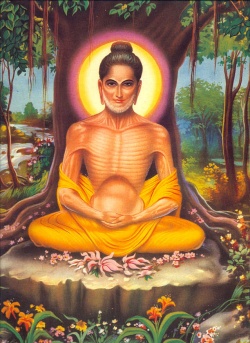Difference between revisions of "Enlightenment the process of understanding"
(Redirected page to Bodhi) |
|||
| (17 intermediate revisions by 4 users not shown) | |||
| Line 1: | Line 1: | ||
| − | + | [[File:Buddha12.jpg|thumb|250px|]] | |
| + | |||
| + | |||
| + | |||
| + | |||
| + | |||
| + | |||
| + | While the English [[word]] [[enlightenment]] refers to the process of [[understanding]], the [[Pāḷi]] [[word]] usually translated as [[enlightenment]], [[bodhi]], both means ‘to [[awaken]],’ or ‘to understand,’ i.e. to open the [[eyes]]. When, as a result of practising the [[Buddha]]’[[s]] [[Dhamma]], one deeply, fully and directly realizes the [[impermanent]], inadequate and [[selfless]] [[nature]] of | ||
| + | |||
| + | [[conditioned]] [[phenomenon]] one is said to have become or to have [[attained]] [[enlightenment]]. Quite automatically, this [[realization]] brings about a radical change in one’s [[experience]] and one’s {{Wiki|behaviour}}. [[Frustration]], [[anxiety]] and | ||
| + | |||
| + | {{Wiki|fear}} are replaced by [[peace]] and [[joy]]. A [[person]] who is [[enlightened]] is called either a [[Buddha]] or an [[arahat]]. The [[state]] itself is also often called [[Nirvāṇa]]. | ||
| + | |||
| + | |||
| + | According to the [[Buddha]] [[enlightenment]] comes in four stages, each triggered by the presence of particular [[spiritual]] qualities and the [[realization]] of certain [[truths]]. The first of these stages, [[Stream Winning]] (''[[sotapāpatti]]''), starts a process which | ||
| + | |||
| + | inevitably leads to complete [[enlightenment]], either within a {{Wiki|matter}} of minutes or perhaps a few lifetimes. [[Stream Winning]] is characterized by unshakable [[sense]] of {{Wiki|certainty}} about the [[Three Refuges]] (''[[aveccapasāda]]''), effortless [[morality]] | ||
| + | |||
| + | (''[[sīla]]''), a [[realization]] that the [[body]] is not the [[self]] (''[[sakkāyadiṭṭhi]]'') and no longer [[clinging to morality and rules]] (''[[sīlavataparamāsa]]'', D.III,227). The other stages are called [[Once Returning]] (''[[sakadāgāmitā]]''), [[Non Returning]] ([[anāgāmitā]]) and the final stage, [[complete enlightenment]] (''[[arahatta]]''). | ||
| + | |||
| + | |||
| + | {{R}} | ||
| + | [http://www.buddhisma2z.com/content.php?id=124 www.buddhisma2z.com] | ||
| + | [[Category:Buddhist Terms]] | ||
| + | [[Category:Enlightenment]] | ||
Latest revision as of 20:10, 15 February 2024
While the English word enlightenment refers to the process of understanding, the Pāḷi word usually translated as enlightenment, bodhi, both means ‘to awaken,’ or ‘to understand,’ i.e. to open the eyes. When, as a result of practising the Buddha’s Dhamma, one deeply, fully and directly realizes the impermanent, inadequate and selfless nature of
conditioned phenomenon one is said to have become or to have attained enlightenment. Quite automatically, this realization brings about a radical change in one’s experience and one’s behaviour. Frustration, anxiety and
fear are replaced by peace and joy. A person who is enlightened is called either a Buddha or an arahat. The state itself is also often called Nirvāṇa.
According to the Buddha enlightenment comes in four stages, each triggered by the presence of particular spiritual qualities and the realization of certain truths. The first of these stages, Stream Winning (sotapāpatti), starts a process which
inevitably leads to complete enlightenment, either within a matter of minutes or perhaps a few lifetimes. Stream Winning is characterized by unshakable sense of certainty about the Three Refuges (aveccapasāda), effortless morality
(sīla), a realization that the body is not the self (sakkāyadiṭṭhi) and no longer clinging to morality and rules (sīlavataparamāsa, D.III,227). The other stages are called Once Returning (sakadāgāmitā), Non Returning (anāgāmitā) and the final stage, complete enlightenment (arahatta).
